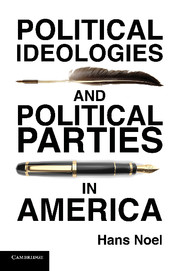Book contents
3 - Creative Synthesis
Why Ideology?
Published online by Cambridge University Press: 05 June 2014
Summary
Words, we are told, have power. Pens are mightier than swords, and ideas are both bulletproof and dangerous.
This endorsement of ideas and the words that articulate them is as vague as it is enthusiastic. This chapter attempts to get a little more specific. This book is about a particular way in which ideas matter. Whatever other power they may have, and they surely do have other power, ideas win in this book by getting help. First, they get the help of other ideas, forming coalitions of ideas that we call ideologies. Second, they get the help of politicians, who adopt those coalitions for their own purposes.
This section is about the first process. It is a useful metaphor to say that ideas enlist the aid of other ideas, but it is just a metaphor. Ideas do not actually bargain with one another; people do the work. This chapter attempts to work out the mechanism by which we can see human actors bringing ideas into connection with other ideas, and isolate a few patterns we will expect to find. Such patterns cannot be predictive, because there are so many ways in which creative thinkers can synthesize ideas. But they will provide a framework for the rest of the book.
- Type
- Chapter
- Information
- Political Ideologies and Political Parties in America , pp. 38 - 66Publisher: Cambridge University PressPrint publication year: 2014



